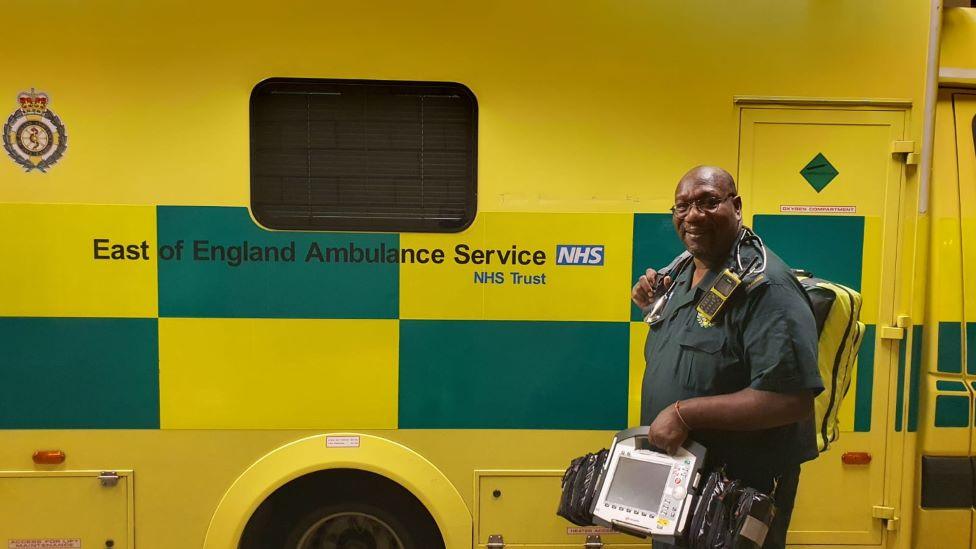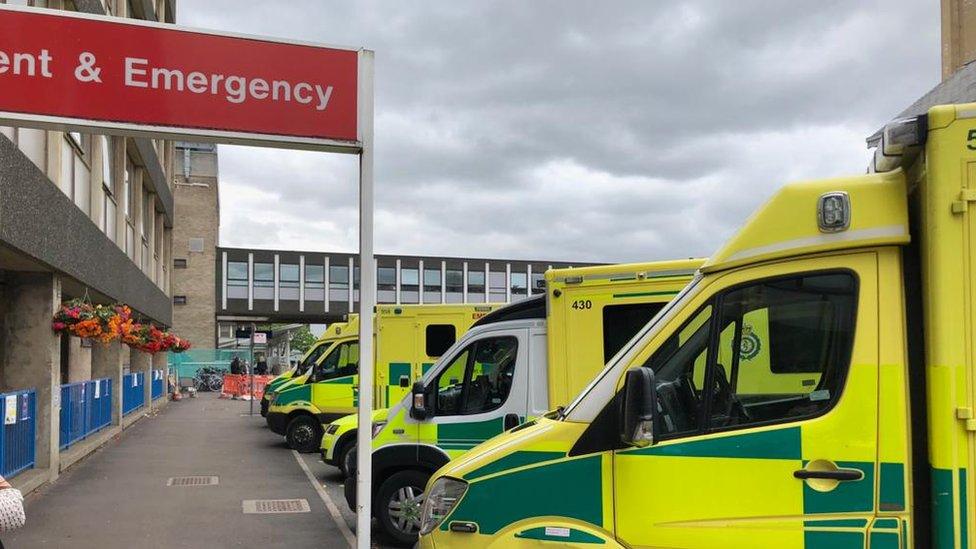East of England Ambulance Trust accused of institutional racism
- Published

Members of staff say racist attitudes are sometimes dismissed as "banter"
An ambulance trust has been accused of an "historic and institutional culture of racism" by staff in a new report.
Staff at the East of England Ambulance Trust (EEAST) reported inappropriate comments and behaviours which were often dismissed as "banter".
There were reports of racial slurs from staff and assumptions non-white staff could speak other languages.
"Behaviour like this has no place in our Trust," EEAST chief executive officer Tom Abell said.
The report was collated from responses to the trust's 'BME Survey' last year.
Accusations of "toxic bullying" have previously been levelled at the trust.
In total, 58 out of the 120 selected employees answered the survey and 26 employees also took part in a one to one confidential telephone interview.
The report found there were "risks that a historic and institutional culture of racism may exist within EEAST."
There were multiple concerns non-white members of staff were often overlooked for promotion and there was a "nepotism, favouritism, cliques and 'your face doesn't fit' culture".
One employee said when their team wanted to order curry for dinner it was suggested they would be "sick of them as I eat them all the time".
Another said they walked in on colleagues making a racial slur when discussing an Asian doctor.
Staff reported the racial bias within the trust also extended to the treatment of patients by some ambulance crew members.
One reported seeing a crew member open the blouse of a woman who did not speak English and did not speak to her via the interpreter.
'Learn to speak my language'
Multiple members of staff said colleagues made assumptions they could speak other languages, based on their skin colour.
A manager was said to have asked a colleague: "Can you speak to them, as they speak 'gobildy gook'?"
"It is just assumed that if you are 'of colour', you all come from the same place and speak the same language", the staff member said.
One person asked a colleague to translate for someone speaking Arabic. "The reason given for the request was that 'I look like one of them'", they said.
Another said a call handler often muted calls from patients who did not speak English as a first language and said loudly "if you live in my country then learn to speak my language".
Many staff reported "banter" was often used to try and disguise or dismiss the problem.
One member of staff said: "Banter is a real problem. We need to have a zero tolerance on banter and name calling. A lot of times, people just say they were joking and use this to hide their prejudices."
After complaining about a colleague's behaviours, one member of staff said they felt they were "gas lit" and told they were too "sensitive".
Others said they were told to "ignore" comments and behaviours.
'Culture of xenophobia'
More than half of the employees surveyed said they did not feel confident reporting inappropriate behaviour and complaints and feeling like it would be dealt with appropriately.
Around 60% said individual differences in respect of race, ethnicity and colour were not respected.
The report from the trust referenced 1970s-style "old fashioned attitudes" and an "old school cohort" of employees.
However, it said that was not the root cause. It said the findings were "symptomatic of a more general underlying and unchallenged culture of xenophobia within some 'pockets' of trust employees".
In response, the trust said the report showed "evidence of very outdated behaviours and attitudes among a minority of managers".
"There could be a negative impact on the trust's reputation as a safe and positive place to work", board papers for the trust said.
'Bullying and dark culture'

Glenn Carrington, UNISON Chairperson, says there is a "mountain to climb" to tackle racism within EEAST
Results of the survey are to be discussed at an EEAST board meeting on Wednesday.
Senior Paramedic Glenn Carrington, 58, is the UNISON Branch Chairperson for EEAST. He said he's witnessed a lot of internal racism in his 37 years at the trust.
However, he said this had changed over time to be "less in your face and more micro aggressions".
Attempts to tackle a "bullying and dark culture" within the trust are being made, he said.
He added: "It still goes on, they are trying to tackle it but they have a mountain to climb. But they are trying."
The trusts' CEO Tom Abell said: "We commissioned this independent research to better understand the working lives of our colleagues.
"It shows that there are some instances of inappropriate behaviour at the trust and I am sorry to all of my colleagues who have experienced this.
"I am clear that behaviour like this has no place in our trust and will be eradicated.
"We have a wide-ranging plan to tackle this behaviour and make EEAST a more inclusive place to work.
"We have made good progress to improving our culture - as shown by our recent improved report from the Care Quality Commission.
"We would like to thank everyone who participated in the research and colleagues who continue to call out this type of behaviour."

Find BBC News: East of England on Facebook, external, Instagram, external and Twitter, external. If you have a story suggestion email eastofenglandnews@bbc.co.uk
- Published11 October 2020

- Published28 November 2019

- Published30 September 2020
